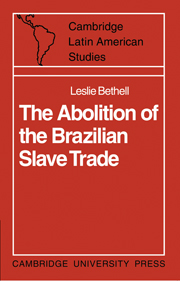Book contents
- Frontmatter
- Contents
- Preface
- Maps
- Abbreviations
- 1 First steps towards abolition, 1807–1822
- 2 Independence and abolition, 1822–1826
- 3 Brazil and the slave trade, 1827–1839
- 4 Treaty negotiations, 1830–1839
- 5 The British navy and the mixed commissions, 1830–1839
- 6 The extension of Britain's powers, 1839
- 7 Britain and the slave trade, 1839–1845
- 8 Slave trade, slavery and sugar duties, 1839–1844
- 9 Lord Aberdeen's Act of 1845
- 10 The aftermath of the Aberdeen Act
- 11 Changing attitudes and plans of action, 1845–1850
- 12 Crisis and final abolition, 1850–1851
- 13 The aftermath of abolition
- Appendix: Estimates of slaves imported into Brazil, 1831–1855
- Bibliography
- Index
10 - The aftermath of the Aberdeen Act
Published online by Cambridge University Press: 04 August 2010
- Frontmatter
- Contents
- Preface
- Maps
- Abbreviations
- 1 First steps towards abolition, 1807–1822
- 2 Independence and abolition, 1822–1826
- 3 Brazil and the slave trade, 1827–1839
- 4 Treaty negotiations, 1830–1839
- 5 The British navy and the mixed commissions, 1830–1839
- 6 The extension of Britain's powers, 1839
- 7 Britain and the slave trade, 1839–1845
- 8 Slave trade, slavery and sugar duties, 1839–1844
- 9 Lord Aberdeen's Act of 1845
- 10 The aftermath of the Aberdeen Act
- 11 Changing attitudes and plans of action, 1845–1850
- 12 Crisis and final abolition, 1850–1851
- 13 The aftermath of abolition
- Appendix: Estimates of slaves imported into Brazil, 1831–1855
- Bibliography
- Index
Summary
In 1845 Lord Aberdeen had felt compelled to seek authorisation for the kind of high-handed anti-slave trade measures more readily associated with the name of Lord Palmerston. He had, however, shown a much greater concern than his predecessor for at least the façade of legality: in instructing British warships to seize all Brazilian ships engaged in the slave trade and British vice-admiralty courts to adjudicate upon them the British government, it was claimed, were merely exercising their treaty rights. And as Peel was at pains to explain to the House of Commons, it was ‘the mildest measure to which they [the British government] could resort’ they were deliberately not seeking authority from Parliament for British courts to punish Brazilian subjects engaged in the slave trade as under article I of the treaty of 1826 they had every right to do. Moreover, the decision to introduce the Brazil (Slave Trade) bill had been taken ‘with pain and only under the last necessity’. At the time of its passage Aberdeen offered to repeal it, either when the slave trade had finally ceased or when the Brazilian government signed an anti-slave trade treaty acceptable to Britain.
When in March 1845 the Brazilian government had professed a willingness to enter negotiations for a new anti-slave trade treaty they had done so in the belief that by terminating the right of search treaty of 1817 they had seized the diplomatic initiative and put themselves in a strong position to dictate its terms: the British government would now have to accept Brazil's treaty proposals, they reasoned, or else abandon entirely their efforts to suppress the Brazilian slave trade.
- Type
- Chapter
- Information
- The Abolition of the Brazilian Slave TradeBritain, Brazil and the Slave Trade Question, pp. 267 - 295Publisher: Cambridge University PressPrint publication year: 1970



